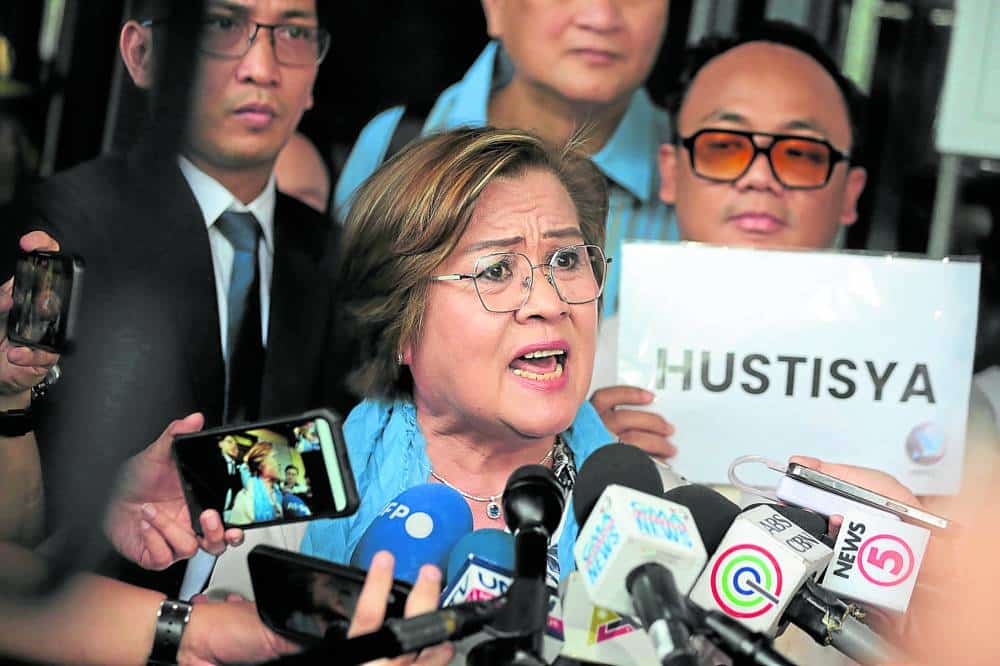Categorybetmcc online casino De Lima: Nanlaban, reward concepts started in Davao even before 2016
POSITION:Ji777 - JI777 Casino - ji777 vip login - JI777 Casino Games > JI777 Casino Games >betmcc online casino De Lima: Nanlaban, reward concepts started in Davao even before 2016
Updated:2024-10-22 13:33 Views:128
Former senator Leila De Lima talks to reporters outside the Muntinlupa City Hall of Justice in Muntinlupa City in this June 24, 2024 file photo after the court cleared her of the third and last charge of conspiracy to commit drug trading. INQUIRER PHOTO / GRIG C. MONTEGRANDE
MANILA, Philippines — Former senator Leila de Lima has reiterated that the “nanlaban” concept — or claims that drug suspects fought it out against police officers — along with the rewards system for policemen in anti-drug operations originated from Davao City.
During the ninth quad committee hearing held on Tuesday, de Lima testified regarding her knowledge of former president Rodrigo Duterte’s drug war, from her time as Commission on Human Rights (CHR) chairperson, Justice secretary, and then as senator.
Article continues after this advertisementAt one point, de Lima was asked by 1-Rider party-list Rep. Ramon Rodrigo Gutierrez if rumors of police officers planting evidence in anomalous anti-drug operations were part of the so-called Davao Death Squad (DDS) operations.
FEATURED STORIES NEWSINFO Kristine now a tropical storm; Signal No. 1 up in 24 areas nationwide NEWSINFO Walang Pasok: Class suspensions on Tuesday, Oct. 22 NEWSINFO Sandro Marcos calls out VP Sara Duterte: ‘You crossed the line’“We also have to consider that for the supposedly legitimate operations in which later on there is allegedly planting of evidence, nanlaban, drug bust or buy-bust which had gone wrong, I think this would be considered as, under the auspices of a legitimate police operation. Now my question to the former senator is, was this part of the so-called DDS operations?” Gutierrez said.
“To answer your question, your Honor, I have to point out that the nanlaban concept originated in Davao, and was invented by the DDS. So it’s not something new,” de Lima said.
Article continues after this advertisement“So there may be fewer cases then because most of the cases involved riding-in-tandem, vigilante killings, as induced by then mayor Rodrigo Duterte, but there are also specific cases like that because the nanlaban concept originated from the DDS operations,” she added.
Article continues after this advertisementBefore this, de Lima made a presentation containing information obtained by the CHR during its 2009 investigation, where it was stated that from years 1988 to 2000, P15,000 was given under the drug rewards system — P5,000 to the handler, and P10,000 to the assassin.
Article continues after this advertisementThe rates changed from 2001 to 2016: P3,000 to P5,000 for the handler, P7,000 to P8,000 for the assassin, and P500 to P1,000 for the civilian informant.
“According to a witness in the 2009 CHR investigation, during the first period of the DDS from 1988-2000, the assassins were paid P15,000 for every victim. P5,000 goes to the police handler and P10,000 to the assassins who at that time consisted of rebel returnees aside from the active-duty policemen who were their handlers,” de Lima said.
Article continues after this advertisement“Their safehouse was located inside the Napolcom (National Police Commission) compound in Brgy. San Pedro, Davao. After the summary execution of targeted victims, the DDS members would re-group at their safehouse and divide the reward. During that time, MRRD sometimes personally gave out the kill orders and the reward money directly to the assassins themselves,” she added.
Duterte’s drug war is one of the issues being probed by the quad committee, which started its investigation last August 16. At the second hearing alone, Duterte was accused of being behind the killing of three Chinese nationals detained at the Davao Prison and Penal Farm.
According to the testimony from self-confessed killer Leopoldo Tan, he and a certain Fernando Magdadaro were hired to kill Chu Kin Tung, Jackson Lee, and Peter Wang — the three detainees serving time for drug-related charges.
Tan claimed that Bureau of Corrections official S/Supt. Gerardo Padilla talked to a person over the phone after the alleged kill order was carried out, whom he identified as Duterte. Tan said Duterte even congratulated the jail officer.
READ: Duterte ordered killing of 3 Chinese men in 2016, hitman claims
Eventually, discussions of EJKs moved towards a testimony from former police colonel Royina Garma about the national anti-drug campaign adopting a “Davao template”, where police officers involved in killings would be given monetary rewards.
READ: Garma bares monetary reward range under ‘Davao drug war template’
Testifying before the quad committee last October 11, Garma said Duterte contacted her in May 2016 about the creation of a national task force, tasking her to find a Philippine National Police (PNP) officer or operative who is a member of the Iglesia Ni Cristo, who can implement the drug war on a national scale, while “replicating the Davao model.”
READ: Garma says Davao drug war template, rewards system applied in entire PH
Subscribe to our daily newsletter
According to Garmabetmcc online casino, those who are able to kill drug suspects are rewarded money ranging from P20,000 to P1 million.
READ NEXT Marcos: PCG ‘never alone’ in mission to protect PH Camarines Sur orders mandatory evacuation in high-risk areas EDITORS' PICK NBA: Nuggets give Aaron Gordon 4-year, $133M extension Central Visayas’ most wanted killed in shootout in Argao, Cebu INQside Look with senatorial aspirant Tito Sotto Tropical Storm Kristine slightly intensifies; Signal No. 2 in 5 areas WPS: US missile deployment to PH key for combat readiness – US general Manila Water Foundation and partners underscore benefits of handwashing MOST READ SC issues TRO vs Comelec resolution on dismissed public officials Tropical Storm Kristine slightly intensifies; Signal No. 2 in 5 areas LIVE UPDATES: Tropical Storm Kristine Espenido retracts drug-related allegations vs De Lima View comments